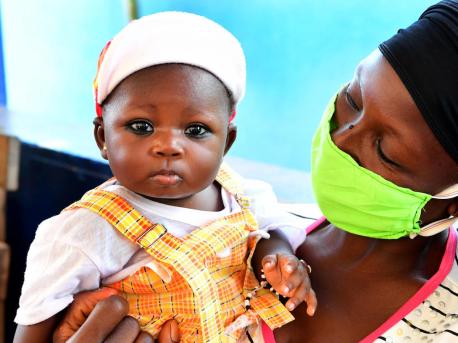
COVID-19 Threatens the World's Children in More Ways Than One
A surge in coronavirus cases threatens to overwhelm health systems in low- and middle-income countries and disrupt routine services, claiming the lives of 6,000 children every day from preventable causes over the next six months, according to startling evidence published by the Lancet.
Left unchecked, these potential disruptions will be more catastrophic to children and mothers than COVID-19 itself, UNICEF Executive Director Henrietta Fore wrote in a Comment about the study, entitled, "A wake-up call: COVID-19 and its impact on children's health and wellbeing."
The new Lancet study outlines the alarming effects of a projected drop in essential health services in 118 countries due to COVID-19
Drawing on lessons learned from previous outbreaks of Ebola virus disease and severe acute respiratory syndrome (SARS), researchers from the Johns Hopkins Bloomberg School of Public Health outline the alarming effects of a projected drop in essential health services in 118 countries in the coming months.
Interpreting their findings, researchers reported that while the COVID-19 pandemic will increase mortality due to the virus, it is also likely to increase mortality indirectly. "If routine health care is disrupted and access to food is decreased (as a result of unavoidable shocks, health system collapse, or intentional choices made in responding to the pandemic), the increase in child and maternal deaths will be devastating."
Immunization programs have been put on hold, preventing children from receiving lifesaving protection from vaccine-preventable diseases. Nutrition programs have been suspended and family incomes lost, leaving children in danger of becoming severely malnourished. In countries with already weakened health systems, medical supply chains are breaking down. Visits to health care centers are declining due to lockdowns, curfews and fears of infection.
The global number of children dying before their 5th birthdays could increase for the first time in decades
"Under a worst-case scenario, the global number of children dying before their fifth birthdays could increase for the first time in decades," Fore said. "We must not let mothers and children become collateral damage in the fight against the virus. And we must not let decades of progress on reducing child and maternal deaths be lost."
"Whenever UNICEF talks about big numbers, we never forget that there are human faces — the face of a mom, the face of a child — behind those numbers," said James Elder, Chief of Communication for UNICEF Eastern and Southern Africa. In the video above, Elder introduces Gertrude, a mother in Kenya struggling to protect her children from the effects of the COVID-19 pandemic.
UNICEF is working to prevent COVID-19 transmission and treat those who become infected. At the same time, UNICEF is working with governments to make sure COVID-19 containment measures don't hurt kids, including maintaining routine health services for children and mothers, ensuring continuity of learning, keeping mothers and children safe and protected from violence and scaling up social protections to keep children and families afloat.
UNICEF is also advocating to governments and big donors to get cash into the hands of people like Gertrude, so they can keep their children healthy and learning during the coronavirus pandemic.
UNICEF is working to protect children from being infected by COVID-19 and affected by its consequences
According to the study's modeling, worst-case scenarios show that 10 countries could potentially have the greatest number of additional child deaths: Bangladesh, Brazil, Democratic Republic of Congo, Ethiopia, India, Indonesia, Nigeria, Pakistan, Uganda and United Republic of Tanzania. The countries that are most likely to witness the highest excess child mortality rates under the worst-case scenario are Djibouti, Eswatini, Lesotho, Liberia, Mali, Malawi, Nigeria, Pakistan, Sierra Leone and Somalia.
"The COVID-19 crisis is a child rights crisis," said Fore. "We need an immediate-, medium- and longterm response that not only addresses the challenges created by the pandemic and its secondary impacts on children, but also outlines a clear vision for building back a better world when the crisis finally recedes. For that, we need everyone's ideas, resources, creativity and heart. It is our shared responsibility today, to reimagine what the world will look like tomorrow."
Your generous contribution will help UNICEF be there for children during the coronavirus pandemic.
Top photo: A mother and her baby at the UNICEF-supported Primature health center of San Pedro in southwest Côte d’Ivoire on May 14, 2020. © UNICEF/UNI330292// Frank Dejongh


